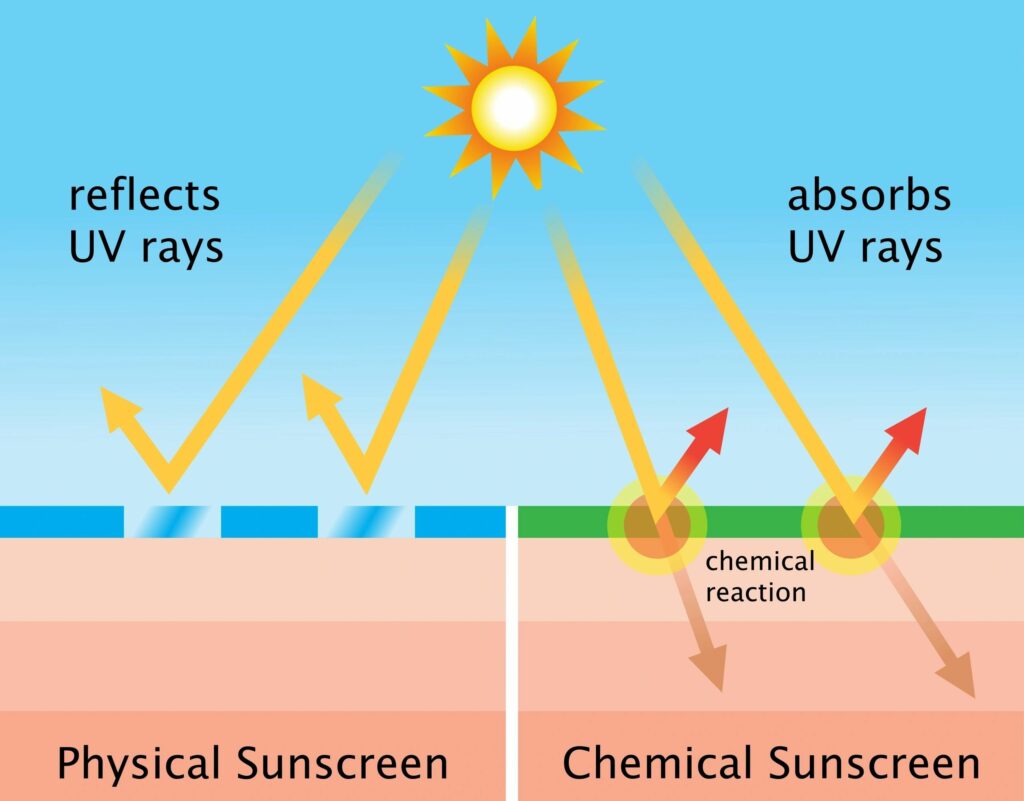Sunscreen is a crucial component of any skincare routine, safeguarding your skin against harmful ultraviolet (UV) rays emitted by the sun. Consistent use of sunscreen protects your skin from premature aging, such as wrinkles and age spots, and significantly reduces the risk of skin cancer. It also prevents sunburn and reduces skin discoloration, ensuring an even skin tone. Regardless of weather or season, applying sunscreen is essential as UV rays can penetrate through clouds and reflect off surfaces like water and snow. Therefore, for comprehensive skincare that fosters healthy and youthful skin, sunscreen is not a step to be missed.
Why Everyone Needs Sunscreen?
Sunscreen is a universal need, irrespective of age, gender, or skin type. The damaging effects of the sun’s ultraviolet (UV) rays are omnipresent and can harm anyone’s skin. There are two types of UV rays – UVA and UVB. UVA rays, known for their aging effects, can cause wrinkles and age spots, leading to premature aging. UVB rays are the primary cause of sunburn and play a key role in the development of skin cancer.
Daily use of sunscreen blocks these harmful rays, protecting the skin and preserving its health. Even on cloudy days, up to 80% of UV rays can penetrate the skin, underscoring the importance of daily sunscreen use.
Furthermore, sunscreen is crucial in preventing hyperpigmentation and promoting an even skin tone. It also adds a protective layer that shields the skin from environmental pollutants and free radicals that can lead to skin damage.
For individuals with lighter skin, sunscreen is vital in reducing the risk of sunburn and skin cancer. Those with darker skin, while less susceptible to sunburn, are still at risk of skin cancer and the effects of photoaging.
Physical vs. Chemical Sunscreens: Which is Right for You?

When choosing a sunscreen, it’s essential to understand the two main types available: physical (or mineral) and chemical sunscreens.
- Physical Sunscreens: These act as a shield on your skin, reflecting or scattering UV rays away from the skin. They use active mineral ingredients, such as zinc oxide and titanium dioxide. Physical sunscreens are less likely to cause skin irritation, making them a good choice for those with sensitive skin. They begin protecting immediately upon application and are less likely to clog pores. However, they may leave a white cast on the skin and may not be as water-resistant as chemical sunscreens.
- Chemical Sunscreens: These work by absorbing UV rays and converting them into heat that is then released from the skin. They use organic (carbon-based) compounds, such as oxybenzone, avobenzone, and octinoxate. Chemical sunscreens are often more wearable; they blend well with the skin without leaving a white residue. They are also more likely to be water-resistant. However, some people may find chemical sunscreens irritating, and certain ingredients have raised environmental concerns.
In choosing between physical and chemical sunscreens, consider your skin type, lifestyle, and personal preference. Remember, the best sunscreen is one that you’ll use consistently. Always opt for broad-spectrum sunscreens with an SPF of 30 or higher, which protect against both UVA and UVB rays.
Key Ingredients to Look for in Effective Sunscreens
When shopping for sunscreen, certain key ingredients can indicate the level of protection you’ll get. Here are some significant ingredients to look for:
- Zinc Oxide and Titanium Dioxide: These are the active ingredients in physical or mineral sunscreens. They sit on top of the skin and reflect harmful UVA and UVB rays. Zinc oxide provides broad-spectrum protection against both UVA and UVB rays. Titanium dioxide is excellent at protecting against UVB rays and most UVA rays, though not as broad-spectrum as zinc oxide. Both are ideal for sensitive or reactive skin due to their non-irritating properties.
- Avobenzone, Oxybenzone, Octisalate, Octocrylene, Homosalate and Octinoxate: These are common ingredients in chemical sunscreens. They absorb UV radiation and convert it into heat that’s then released from the skin. Avobenzone provides good UVA protection, while oxybenzone, octisalate, octocrylene, homosalate, and octinoxate are effective against UVB rays. However, some of these ingredients, especially oxybenzone and octinoxate, have raised concerns due to their potential environmental impact.
- Broad-Spectrum Protection: While not an ingredient, look for sunscreens labeled as “broad-spectrum”. This indicates that the product protects against both UVA rays (which cause aging) and UVB rays (which cause sunburn).
- Antioxidants: Some sunscreens include antioxidants, such as vitamins C and E. These can help protect the skin against free radical damage from UV rays and pollution.
- Hyaluronic Acid and Ceramides: For added moisturizing benefits, look for sunscreens that include hydrating ingredients like hyaluronic acid and ceramides. These are especially helpful for those with dry skin.
Remember, sunscreen should be applied daily, and it’s crucial to select a product that suits your skin type, is broad-spectrum, and has an SPF of 30 or higher.
Related: Benefits for using sunscreen everyday.
Best Sunscreens for All Skin Types

Sunscreens are not a one-size-fits-all product. Depending on your skin type and personal needs, some products will suit you better than others. Here are top-rated sunscreens across various categories:
Best Sunscreen for Overall Skin
1. EltaMD UV Clear Broad-Spectrum SPF 46
Dermatologist-recommended, this sunscreen offers broad-spectrum protection and is lightweight and silky. It’s suitable for all skin types and conditions, including rosacea and acne. It also contains niacinamide (vitamin B3), hyaluronic acid, and lactic acid, which work together to soothe and hydrate the skin while reducing redness.
2. La Roche-Posay Anthelios Melt-in Milk Sunscreen SPF 60
This sunscreen is renowned for its high SPF rating and broad-spectrum coverage. It melts effortlessly into the skin without leaving a white cast and is suitable for all skin types.
Best Sunscreen for Sensitive Skin
1. Aveeno Protect + Hydrate Lotion Sunscreen SPF 50 for Face
Created for sensitive skin, this sunscreen is oil-free, hypoallergenic, and sweat- and water-resistant for up to 80 minutes. It contains oat, well-known for its skin-soothing properties, and provides broad-spectrum protection.
2. Neutrogena Sensitive Skin Face Liquid Sunscreen SPF 50
This sunscreen offers superior sun protection in a lightweight liquid formula that spreads easily over skin and absorbs quickly for a weightless feel. It’s fragrance-free, oil-free, hypoallergenic, and non-comedogenic, making it ideal for sensitive skin types.
Best Sunscreen for Oily Skin
1. CeraVe Ultra-Light Moisturizing Lotion SPF 30
Perfect for oily skin, this moisturizer-sunscreen hybrid provides broad-spectrum protection and a matte finish, thanks to its oil-absorbing technology. It also contains ceramides and hyaluronic acid to retain your skin’s moisture without adding greasiness.
2. Paula’s Choice RESIST Super-Light Daily Wrinkle Defense SPF 30
This product’s light, satin-matte finish is perfect for those with oily skin. It’s a broad-spectrum sunscreen, and its antioxidants and resveratrol content help defend against environmental damage.
Best Sunscreen for Dry Skin
1. Vichy Capital Soleil Moisturizing Sunscreen Lotion SPF 60
This sunscreen is packed with hyaluronic acid, a powerhouse ingredient that draws moisture to the skin, making it a great choice for dry skin types. It offers broad-spectrum protection and is water-resistant for up to 80 minutes.
2. La Roche-Posay Anthelios Melt-In Sunscreen Milk SPF 60
Known for its intense moisturizing properties and high SPF, this sunscreen is ideal for dry skin. It’s fast-absorbing and leaves skin feeling hydrated without feeling greasy.
Best Sunscreen for Kids:
1. Blue Lizard Australian Sunscreen, Baby SPF 30+
This sunscreen is specifically formulated for children’s sensitive skin. It provides broad-spectrum protection, is water-resistant, and contains no parabens or fragrances, making it a gentle yet effective choice.
2. Neutrogena Wet Skin Kids Sunscreen Spray SPF 70+
This sunscreen is specially designed to work with wet skin, making it perfect for active kids who love the water. The spray format is also great for quick, easy application.
Related: Common Skincare Myths Debunked.
Tips for Applying Sunscreen:
Proper application of sunscreen is just as important as the product itself when it comes to protecting your skin from harmful UV rays. To make sure you’re getting the maximum protection, here are some tips:
- Use the Right Amount: The amount of sunscreen you use matters. As a rule of thumb, you should use about an ounce, or the equivalent of a shot glass, to cover your entire body. This means applying a thick layer to all exposed skin. For your face and neck, a nickel-sized amount is recommended. Don’t forget about often-neglected areas such as your ears, back of the neck, back of the knees, and tops of your feet.
- Apply Ahead of Time: Don’t wait until you’re already outside to apply sunscreen. Instead, put it on 15 to 30 minutes before you go out. This gives the active ingredients time to bind to your skin, providing better protection from the sun’s rays.
- Reapply Regularly: No matter how high the SPF, no sunscreen lasts all day. Reapply your sunscreen at least every two hours, and more often if you’re swimming, sweating, or towelling off. Even water-resistant sunscreens should be reapplied after water exposure.
- Don’t Rely Solely on Sunscreen: While sunscreen plays a crucial role in skin protection, it shouldn’t be your only defense against the sun. Consider additional measures like wearing sunglasses, wide-brimmed hats, and sun-protective clothing, and seeking shade during peak sunlight hours (10 a.m. to 4 p.m.).
- Use Sunscreen All Year Round: Many people only think to use sunscreen in the summer, but the sun’s rays can be just as harmful in other seasons. Even on cloudy days, up to 80% of the sun’s harmful UV rays can penetrate your skin. Snow, sand, and water increase the need for sunscreen because they reflect the sun’s rays.
Conclusion
It’s evident that sunscreen is a non-negotiable part of skincare, regardless of the season or skin type. From preventing skin cancer to avoiding premature aging, its benefits are paramount. By understanding the different types of sunscreens and key ingredients, you can make an informed choice that suits your specific needs. Always remember, the best sunscreen is one you’ll use regularly. So find your perfect match, apply it correctly and embrace the sun with confidence and care.


